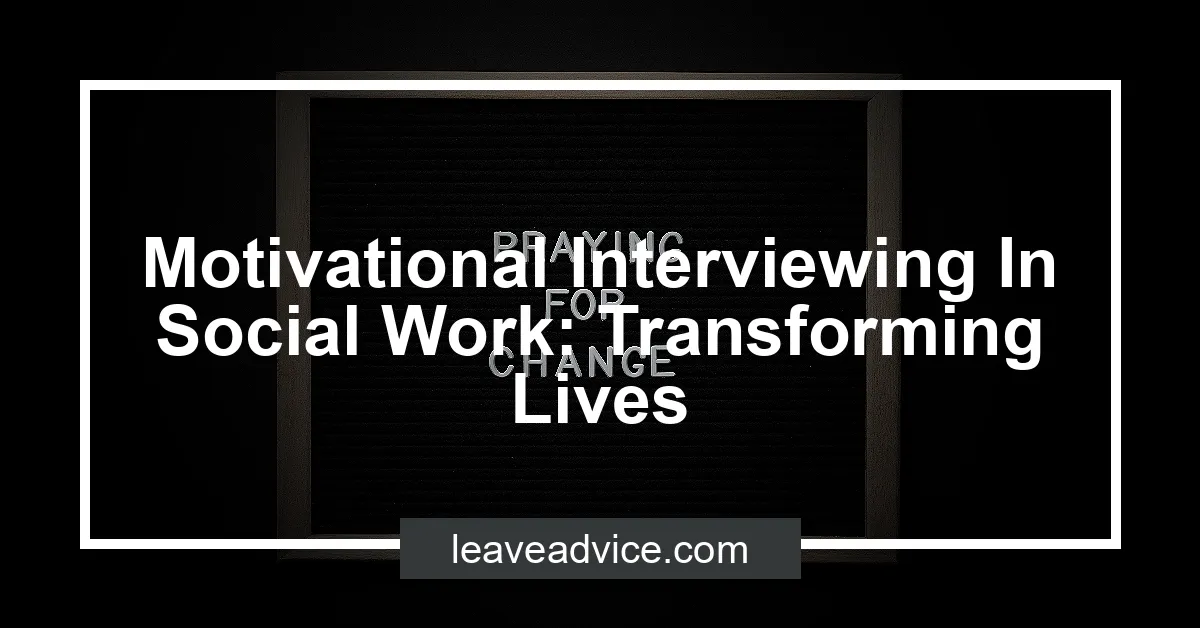Motivational Interviewing In Social Work: Transforming Lives


Motivational interviewing is a widely used approach in the field of social work to support individuals in making positive behavior changes. The overall intention of motivational interviewing is to create a supportive, non-judgmental, and directive environment that facilitates the exploration of motivations, readiness, confidence levels, and ambivalence towards change (Miller and Rollnick, 2002).
The Four Processes of Motivational Interviewing
According to Miller and Rollnick, there are four key processes involved in motivational interviewing:
1. Engaging
The first step in motivational interviewing is to establish a rapport and build a therapeutic alliance with the individual. This involves actively listening, showing empathy, and demonstrating a genuine interest in the person’s experiences and perspectives.
By creating a safe and supportive space, social workers can encourage open and honest communication.
2. Focusing
Once engagement is established, the focus shifts to identifying and exploring the specific areas or goals that the individual wants to address. Social workers can help individuals clarify their goals and prioritize them based on their importance and readiness for change.
This process allows for a more targeted and effective intervention.
3. Evoking
Motivational interviewing emphasizes the individual’s intrinsic motivation for change. Social workers use various strategies to evoke and amplify the person’s own motivations, values, and strengths.
By highlighting the potential positive outcomes of change and exploring any ambivalence, social workers can help individuals build confidence and commitment to taking action.
4. Planning
The final process of motivational interviewing involves collaboratively developing a concrete and realistic plan for change. Social workers work with individuals to identify specific steps, strategies, and resources that will support their goals.
This may include exploring potential barriers and brainstorming solutions. The plan is tailored to the individual’s unique circumstances and preferences and incorporates their autonomy and self-efficacy.
How Motivational Interviewing is Applied in Social Work Practice
Motivational interviewing has gained popularity in social work practice for its focus on collaboration, respect for autonomy, and emphasis on the individual’s own motivation for change. It is particularly effective in addressing behaviors such as substance abuse, mental health issues, and unhealthy lifestyle choices.
Social workers trained in motivational interviewing techniques can effectively engage with individuals, facilitate behavior change, and enhance treatment outcomes. The empathetic and non-judgmental approach of motivational interviewing aligns with the core values of social work, promoting a client-centered and strengths-based perspective.
Benefits of Motivational Interviewing in Social Work
Motivational interviewing offers several benefits in the field of social work:
-
Enhanced Engagement: The person-centered approach of motivational interviewing promotes a positive therapeutic alliance, increasing engagement and collaboration between the social worker and the individual.
-
Increased Self-Efficacy: By focusing on the individual’s own motivations and strengths, motivational interviewing enhances self-efficacy and empowers individuals to take ownership of their behavior change process.
-
Improved Treatment Outcomes: Motivational interviewing has been found to be effective in improving treatment outcomes, reducing resistance to change, and increasing adherence to recommended interventions.
-
Respect for Autonomy: Motivational interviewing respects individuals’ autonomy and promotes their active participation in decision-making processes, increasing their commitment to change.
Recommended Product: “Motivational Interviewing in Social Work Practice” Book by Melinda Hohman
As a recommended product related to the topic of motivational interviewing in social work, I suggest the book “Motivational Interviewing in Social Work Practice” by Melinda Hohman. This book provides a comprehensive guide to integrating motivational interviewing techniques into social work practice.
It offers practical strategies, case examples, and tools for effectively implementing motivational interviewing with diverse populations.
You can find the book “Motivational Interviewing in Social Work Practice” on Amazon here.


In conclusion, motivational interviewing is a valuable approach in social work practice that supports behavior change by creating a supportive and non-judgmental environment. By engaging, focusing, evoking, and planning, social workers can empower individuals to explore their motivations, enhance readiness for change, and develop concrete plans for achieving their goals.
The book “Motivational Interviewing in Social Work Practice” is a valuable resource for social workers looking to incorporate these techniques into their practice.
Note: The author of this blog article, Lora Turner, is an Experienced HR professional with 15 years of expertise in employee benefits. Please note that the author is not affiliated with any of the recommended products or services mentioned in this blog.




